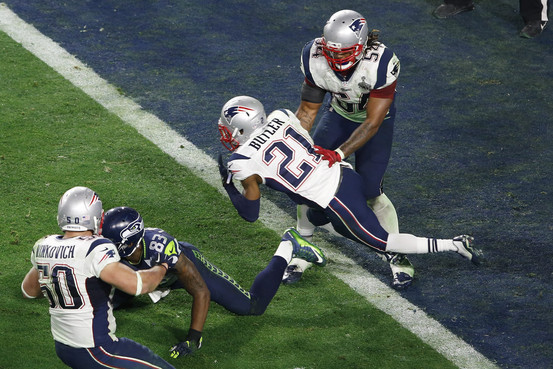
You wait in line, easing around one car-length at a time. Finally, you roll down your window and the voice over the microphone says, “Welcome to Popeyes. Can I take your order?”
Malcolm Butler was that voice, the one who asks you if you want your chicken spicy or mild, your tea sweetened or unsweetened.
Before he became a Super Bowl hero, Malcolm Butler worked the to-go window at Popeyes. That was after nobody much had recruited him out of Vicksburg High School. That was after he was kicked off the Hinds Community College football team after a campus altercation.
“Welcome to Popeyes, can I take your order?”
Well, sure, I’ll have a pass interception on the goal line to win the Super Bowl.
Malcolm Butler’s story is for everybody who a makes a huge mistake. Who flunks the big exam. Who gets kicked out of school. Who gets fired. Who gets told they aren’t quite good enough or tall enough or fast enough.
Malcolm Butler, Super Bowl hero.
Twenty-six seconds remained. The Seattle Seahawks had second and goal at the New England one-yard-line trailing, 28-24. The Hawks needed three feet, 36 inches for victory.
There were 22 players on the field. Would Russell Wilson, the great star from Wisconsin, give it to Marshawn Lynch, the irrepressible one from Washington, or throw to Doug Baldwin of Stanford? Would they run behind James Carpenter of Alabama or Justin Britt of Missouri? Who would make the big defensive play: Vince Woolfork, the monster out of Miami, or Dont’a Hightower of Bama?
So many questions, just one answer.
Only heaven or Pete Carroll knows why the Seahawks didn’t give the ball to Lynch, but they did not.
No, they ran out of the shotgun. They didn’t even fake it to Lynch. The Seahawks ran a straight pass. Ricardo Lockette split out wide to the right behind Jermaine Kearse. The call was for Kearse to clear a path for Lockette to run a simple slant pattern.
Malcolm Butler never let it happen. Later, he would say he saw what would happen before it happened. He saw it in his mind’s eye. Butler didn’t let Kearse get in his way. He broke in front of Lockette before Russell even released the ball. And then, somehow, he caught the ball during the collision.
Malcolm Butler, Super Bowl hero.
Mississippi has produced so many over the years. Jerry Rice starred in three Super Bowls. Eli Manning was the MVP in two of them. Brett Favre led the Packers to a Super Bowl title. L.C. Greenwood sacked Roger Staubach four times in one Super Bowl. The great Willie Brown of Yazoo City once returned a Fran Tarkenton Super Bowl pass 75 yards for a Super Bowl touchdown. Walter Payton helped the Bears shuffle to a Super Bowl ring.
But Jerry Rice was the greatest receiver in the history of the game. Eli Manning’s pedigree is known to all. Favre was in the process of winning three straight NFL MVPs. Greenwood was part of Pittsburgh’s Iron Curtain. Willie Brown might be the greatest corner in the history of the sport. Payton was Payton.
Malcolm Butler? After they let him back on the team at Hinds, he had no Division I scholarship offers. He played his college football at West Alabama, formerly Livingston. When he finished Livingston, 32 NFL teams had a chance to draft him. None did.
But Malcolm Butler kept working, kept believing.
Against all odds, he made the team, worked his way into the rotation and made the biggest play in the most important game. Thus he joins Mississippi’s remarkable Super Bowl pantheon.
Willie Brown, L.C. Greenwood, Walter Payton, Jerry Rice, Brett Favre and Malcolm Butler.
Malcolm Butler.
Super Bowl hero.
Rick Cleveland rcleveland@msfame.com is executive director of the Mississippi Sports Hall of Fame and Museum.
Recent Comments